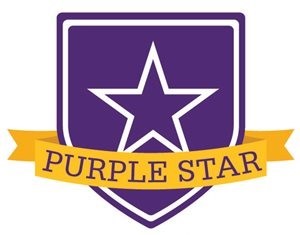- Cama-i, quyana tailuci!
- (Central Yup’ik)
- "Greetings, thank you for coming!"
Alaska launches Purple Star School program to recognize schools supporting military-connected students
For students in military families, moving and switching schools every few years makes the difficulties of childhood and teenage years even more difficult. Now, schools in Alaska will be able to earn recognition for demonstrating support for military-connected students.
The Alaska Purple Star School program will recognize schools that complete three requirements for the award plus one additional activity. Those requirements for the recognition are a dedicated page on the school or district’s website featuring resources for military families, an Active Youth Sponsorship Club (Welcoming Committee), and a Military Family Point of Contact.
“Unlike the civilian world where maybe an average move throughout the student’s school career might be two times, for a military-connected family, that’s an average of about four-to-ten moves in their school career,” said Janet Farris, School Liaison Officer for the U.S. Army Garrison Alaska at Fort Wainwright. “So they’re always changing. They’re always the new student. They’re always needing to learn the standards and regulations of the school district.”
While the Military Interstate Children’s Compact Commission, commonly known as MIC3, addresses key issues military families deal with when relocating including eligibility, enrollment, placement and graduation, the Purple Star School program is an independent program aimed at increasing awareness of the needs of military-connected students and recognizing schools that meet those needs. Military families coming to Alaska will be able to identify the schools that have programs established to support their students.
“What this Purple Star School is saying is we understand the lifestyle you live, and we are here to support you socially, emotionally, and academically. We understand that you live a very unique lifestyle, and it’s not an easy lifestyle to live because you have to think about not only are the students moving schools, but their family member who’s in the military often is deployed or out in the field for a month to two years,” Ferris said. “The school is being recognized for that extra understanding of those military students. You would think that would be something that’s very common, but it is not.”
The Purple Star School program was founded by Ohio’s MIC3 Commissioner. While the program is independent of MIC3, 22 states now have at least one Purple Star School following Ohio’s framework and founding principles. Like Alaska, California and Florida have recently established the program.
Terry Ryals, who was enlisted in the Alaska Army National Guard while working at DEED, helped get the program off the ground in Alaska.
“The Purple Star School program is to just help point out to families this school is actually very supportive of your military status, and if you mention to some other staff that you’re an incoming military family, they will direct you to the right person,” Ryals said. “We’re trying to continue that type of culture where not everyone has to be a subject expert, but as long as you do have the resources then you should be acknowledged for that. That’s the big push – we want to make sure our military families are taken care of.”
While the program is created by legislation in some states, Alaska’s program is administered by the volunteer Purple Star Schools Advisory Board. The board is independent from both MIC3 and DEED.
“We’re excited about it. There’s a lot of military all across the state – Sitka, Ketchikan, Kodiak, Bethel,” said Wayne Marquis, Alaska’s current MIC3 Commissioner and chair of the Alaska Purple Star Schools Advisory Board. Marquis said that the hope is that to program will increase awareness and access to resources not only for schools such as those in Anchorage and Fairbanks that are close to large military posts, but also in schools where military-connected students are a smaller minority.
Ferris, the School Liaison Officer at Fort Wainwright, says that even though the program is directed at improving educational experiences for military-connected students, the benefits will reach beyond just those families.
“We live in a very unique state where many students are transient, not just in the military but other situations – coming in from the villages at certain times of the year and then moving to the next village because of the lifestyle they live,” Ferris said. “It’s showing the importance of needing to support these students in ways that we may not realize that we need to do that. We need to think outside the box, we need to be innovative, we need to be ready at a drop of a hat to help a student who is in true need because they may not be used to the area that they’re living in.”
Schools can apply for the Purple Star School recognition through January of 2022. The inaugural class of recognized schools will be announced in April 2022, the Month of the Military Child.
Find more information about the program including requirements, the application, and resources for serving military-connected families here: https://education.alaska.gov/purplestaraward

